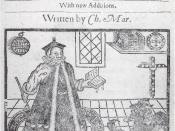In Marlowe's "Doctor Faustus", the relationship between Faustus and Mephastophilis is in essence based only on power. For Faustus, it is the power that forbidden knowledge brings; for Mephastophilis, it is the power he needs from Faustus' soul. The necessity of the relationship stems from this, as each one needs the other, which in itself is a form of power. However, time is an element here, since Mephastophilis needs only to serve a set amount of time, whereas Faustus must ultimately serve an eternity for his desires. Should Faustus have realised this, he might not have signed away his soul so lightly; therefore we can only conclude that he felt in control of the situation that this power relationship entailed. Yet as he grows increasingly doubtful, this feeling of control must have been waning, in turn passing it over to Mephastophilis. In this essay I intend to show how this relationship of shifting power evolved.
From the very beginning of the play, Faustus is shown as a man who has learned all there is to learn, at least of earthly things. It seems that this knowledge has given him a rather dubious sense of confidence, since he has no qualms about summoning Mephastophilis or ordering him to do his bidding from the moment they meet:
I charge thee to return and change thy shape,
Thou art too ugly to attend on me;
Go and return a Franciscan friar,
That holy shape becomes a devil best.
I see there's virtue in my heavenly words! (I.iii.23-7)
From this first encounter, Faustus' idea of control is established; there is power in his words, just as he has power over the demon. From that moment, Faustus is almost doomed in his underestimation of the powers he is dealing with:
Who would not...


